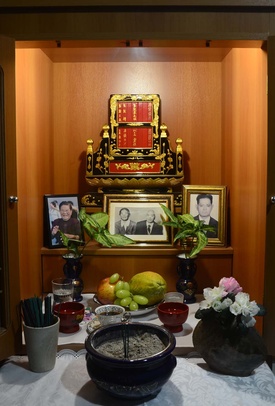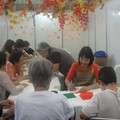I couldn’t understand my friend Emília. I brought her along to spend the holidays at my grandmother's house in Santos, hoping she would put to use her knowledge of the Japanese language, since I had almost none. Or rather, none at all.
But after a few minutes of conversation, she calls me aside and confesses: I can’t understand what your grandmother says!
- What do you mean? You told me you could speak Japanese!
- I know, but I can’t understand anything that she says!”
Emília was right: my grandmother spoke uchinaguchi, the Okinawa dialect. Only some time later did I find out that what I’d always heard her speak was not exactly “Japanese.” And therefore that I was a “bilingual illiterate.” I had no knowledge of either nihongo or uchinaguchi.
One more dichotomy in my life. Whereas in the past I had to deal with the differences between the gaijin and the nihonjin, now I also had to discern those that existed between the naichi (people like Emília, whose ancestors came from the main island) and the uchinanchu (those from Okinawa).
But there is nothing original about my story. In fact, it’s all very common. When I was born, my paternal grandparents were no longer around (I thought they lived in a butsudan) while my maternal grandparents lived in Santos. My parents could understand nihongo, but they used the Okinawa dialect to talk to each other and Portuguese to talk to their daughters. When they did calculations, they used nihongo; when they got angry, the scolding was in uchinaguchi: Sugurarin-do! Yana warabata ... (I knew this sentence well: I’m going to spank you, you hear? Such terrible children...). My older sisters, who had spent time with our grandparents, understood their native language. But I, the fifth daughter, the next-to-last of six female offspring, hadn’t had the chance. I knew only the repertoire of survival. As a result, what wasn’t spoken in Portuguese went into my ears without being processed.
I didn’t see in my parents any concern about (or intention of) transmitting the official Japanese language, or even the dialect, to their daughters. We didn’t attend nihongakko, nor were we encouraged to speak the language at home. A radical break that, I'm sure, had not been premeditated. The intellectualization of life wasn’t their thing. I never asked them the reason for it because I knew they wouldn’t have had an answer. But it was something restricted to the language itself (perhaps the result of a trauma related to their days during and after World War II, I don’t know), as the other traditions followed the normal course at home.
I remember the countless times when my father, during his rare free moments, tried to translate for me the lyrics of the songs he used to listen to on his 78 rpm records. Japanese war marches, folk songs, enka – melodies and lyrics that left him with a distant gaze, dreaming of a land and a people he didn’t really know. After all, he arrived in Brazil when he was 1 year old.
And I, who felt I had nothing to do with what was going on, would slowly slip down the chair until I’d disappear under the table. I’d then find a shortcut to escape from the room.
For a long time I thought it was a good thing not to speak my parents' language. I didn’t have an accent and to a certain extent that made me immune to gibes at school at a time when there were remnants of prejudice against the Japanese and their descendants. I wanted to be a gaijin.
But it was embarrassing, in front of my equals, not to be able to understand a language that matched my slanted eyes. I felt a bit like a deserter. Gomennasai nihongo wakarimasen was my safe-conduct in this “embarrassment zone.”
I was awakened to the importance of my ancestral language when, on a day of ceremony, while facing the butsudan, my gaze following the smoke of the incense, I realized that the first two generations of my family had already become uyafafudi. Ancestors…
I couldn’t help thinking that the next generation to have photographs inside the dark wooden oratory would be my own.
In the intuitively hierarchical line (the elders always take the lead) I looked back and saw two generations impatiently waiting for their turn to offer the ossenko. While there, in mid-field, I felt the need to pass on to the frenetic cellphone texters and dedicated Pokémon hunters the meaning of what was perceived to be a ritual one was obligated to practice. That was, in fact, the allegory of our family’s history. Something to be urgently rescued, for the eyewitnesses were being silenced.
There is no longer anyone I can ask questions to. Immersed in photos, documents, and family mementoes, I began trying to unravel this history. I also started to feel an unprecedented irritation at my lack of knowledge of the Japanese language. Whether it’s my grandparents’ passports, dated 1918, or the centennial ihai and the genealogical tree someone was able to find, the ideograms, indecipherable to me, have become a daily obstacle. And regret, a merciless companion.
These days I need to search on YouTube for the subtitles of the songs my father used to listen to and to thank God that someone actually cared about them. Because this way I get to know a little more about that storyteller who was not very good at talking openly about his own feelings. It’s a little late, I know.
Google, various apps, and flesh-and-blood volunteers have been my guide dogs in this journey, nearly in darkness, through the Japanese language. But there are times I surprise myself, whenever I’m able to understand a few words. There is some kind of a link that makes me understand them more clearly than the translations themselves. An affective sound that seems to be imprinted somewhere inside me and that makes me recognize the voices of my ancestors. I can’t explain what that is. But I do know what they once told me.
While chasing with my eyes the curling smoke of the osenko, I hear my father cradling me: Wa-ta fun-de-chan, ni-ni-shio...
And I calm down. Because I know he's saying to me: sleep, my little cry-baby…
And then I know that this anxiety will pass. And I'll be able to tell the story of this family. In Portuguese. Gomennasai nihongo wakarimasen.
* * * * *
Our Editorial Committee selected this article as one of their favorite Nikkei-go stories. Here is the comment.
Comment from Laura Hasegawa:
The significant number of entries in the Nikkei-go contest made us, Brazilian Nikkei, proud. They consist of 11 authors and 13 widely diverse essays, each dealing with interesting topics and enjoyable themes. But the mission of the Editorial Committee was to choose a single one, which turned out to be an extremely difficult task.
Our choice was an account of unique beauty, deeply sincere in its telling of the ancestors’ legacy while at the same time conveying a feeling of longing and regret for “something” that should have been learned in due time: the Japanese language. In Gaijin, author Heriete Setsuko Shimabukuro Takeda capably depicts what many Nikkei attempt to rescue, namely the heritage left by their ancestors and the need to pass on this legacy to the new generations.
© 2016 Heriete Setsuko Shimabukuro Takeda






